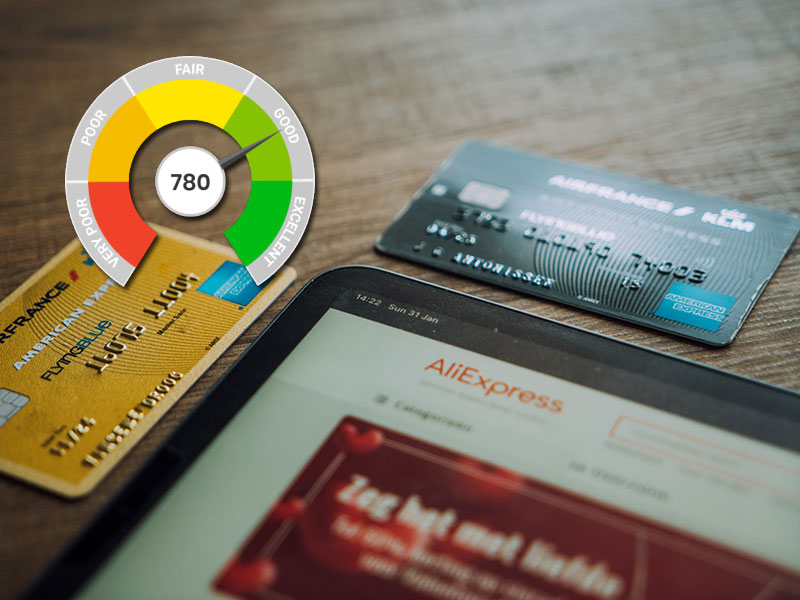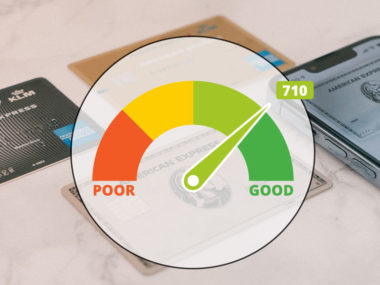
Whether you’re interested in buying a house or a new car, you’ll probably need to finance your purchase. You might need to borrow money to open or expand a business or pay for unusual expenses. Regardless of your reason for looking for a loan, one of the most important factors lenders consider is your credit score.
Besides lenders, many others may request your credit score as well, including credit card issuers, potential landlords, and insurance companies. The higher your credit score, the more options and favorable rates you’ll have. Make sure you understand your credit score range before applying for a loan.

Table of Contents
What Is a Credit Score?
Your credit score is a numerical prediction of your creditworthiness or the likelihood of paying a loan in full and on time. Lending is a business, and lending institutions need to protect their investments. They invest money in you if they extend a loan to you. If they don’t believe you’ll repay your debt, they won’t let you borrow from them.
How Are Credit Scores Formulated?
Companies use scoring models, which are mathematical formulas, to assign a credit score to you using the information found in your credit report. Common factors included when formulating your credit score are:
- Adverse incidents, including bankruptcies, foreclosures, or accounts in collection
- Bill-paying history
- The current total of open debt accounts
- Length of time your loan accounts have been open
- Length of your credit history
- Number and kinds of loans you have
- Percentage of available credit you have used
- Recent credit applications
You have multiple credit scores issued by different credit bureaus, and lenders can look at all of these scores when deciding to issue a loan or credit to you. Several things can affect your score, including:
- Data sources and the information contained in each
- Day of calculation
- Kind of loan product you’re applying for
- The scoring model used to calculate your score
What Is a Credit Report?
Your credit report contains information from multiple sources about any debts you have. Each entry can include:
- Initial loan amount
- Lender
- Kind of loan product
- Payment history, including whether your payments were made on time
- Remaining balance due
Your lenders, landlord, and service providers such as phone and electric companies can report data about your loans and payments to one or more of the three major credit bureaus in the U.S. This information can have a positive or negative effect on your credit score.
If you have a bankruptcy on your credit report, it can affect your score for several years. A Chapter 13 bankruptcy stays on your report for seven years from the date it’s filed, while a Chapter 7 isn’t deleted for 10 years.
What Are the Credit Score Range Categories?
To make your score easier to understand for lenders and personally, your credit score is categorized into a common credit score range:
- Poor: 300-579 (16%)
- Fair: 580-669 (17%)
- Good: 670-739 (21%)
- Very Good: 740-799 (25%)
- Exceptional: 800-850 (21%)
The percentages indicate the number of Americans in each category. Although some lenders accept applications from those in the poor or fair categories, these people typically have to pay a significantly higher interest rate for a loan.
Who Assigns Credit Scores?
The U.S. has three major credit bureaus: Experian, Equifax, and TransUnion. Each of these bureaus may have different information about your debts because lenders don’t necessarily report to all of them. Your scores change as the bureaus receive new information, so you should check your reports regularly.
These bureaus use one of two scoring models to determine your score.
FICO
The FICO scoring model, produced by the Fair Isaac Corporation, is the more widely used model. It utilizes data reported to each credit bureau and assigns three scores, which may be different.
VantageScore
The three major credit bureaus developed this scoring model. The algorithm combines each bureau’s information for you to formulate a single score. Because it includes all available data, some consider VantageScore to have more accuracy than the scores produced by FICO.
How Does Your Credit Score Affect Your Borrowing Power?
Typically, the higher your score is, the better chances you have to obtain a loan, qualify for a higher credit limit or larger loan amount, pay a lower interest rate, receive 0% financing offers, and get better repayment terms. Credit card interest rates vary drastically depending on your credit score.
Home Loans
If you apply for a conventional home mortgage, most lenders require a credit score of 620 or higher. For FHA home loans, you’ll need to have a minimum score of 580. VA loans don’t have a minimum credit score requirement, but you’ll have to meet other strict guidelines.
Though people within the fair credit score range may obtain a mortgage, they present a higher risk to lenders. To counteract this risk, the financial institution may require a sizeable down payment and charge a much higher interest rate than they would to people with higher scores.
In addition, your score can potentially affect the amount of money you can borrow.
Auto Loans
A prime example of how your credit score can affect interest rates is the percentage you would pay for new or used car loans. Check out the interest rates from April through June of 2020, according to an Experian report:
| 300-500 | 500-600 | 600-660 | 661-780 | 781-850 | |
| Used Car | 20.67% | 17.78% | 11.41% | 6.05% | 4.08% |
| New Car | 13.97% | 11.33% | 7.14% | 4.21% | 3.24% |
As you can see, those within the upper credit score range pay significantly less interest than people with poor credit scores. Having a better score can save you a tremendous amount of money.
Should You Check Your Credit Score Range Regularly?
You can have a bill due dates on any day throughout a month, and your creditors may report updated information monthly or even more frequently. Because of this, your credit score can change often.
You can sign up with one of several online sources to see your credit score and things that changed on your report daily if you’d like, although most people only look at their data weekly, monthly, or annually.
Thanks to the Free and Accurate Credit Transactions Act, the U.S. government offers every American to get a free copy of their credit report annually. You can also request a free copy from the three credit bureaus.
Financial advisors recommend checking your credit report regularly for several reasons:
- You’ll see if your report contains incomplete or inaccurate data.
- You can access the information that financial institutions will see if you apply for a loan or other credit product.
- You can track your score to better understand how your actions affect it.
Some people recommend viewing your report yearly, others monthly, and still others quarterly. If you are actively trying to boost your score, you’ll probably want to check it often to see how the things you do affect your credit score range.
Do You Need To Build Your Credit?
Everyone will probably borrow money several times throughout their lives through loans, and many people use credit cards daily. To qualify for these financial products, you need to have a good credit score.
Younger people and those without any credit history don’t have credit scores. These people need to build a score from scratch, which is problematic since borrowing money without a credit score isn’t an easy thing to accomplish.
Fortunately, you can use several credit-building strategies to pave your way to excellent credit:
- Be sure to pay all of your bills on time.
- Ask your utility and phone providers to report your on-time payments to a credit bureau.
- Apply for a loan with a co-signer in a higher credit score range.
- Use a secured credit card
- Get a secured loan or use another credit-building financial product
- Ask a family member with a higher credit score to add you to one of their accounts as an authorized user.
Credit-Building Loans
When you obtain a traditional loan, the lending institution makes the funds available to you once you’ve signed the paperwork. However, you’re unlikely to get a traditional loan if your credit score is low.
Many people with no credit history or low credit scores look for a credit-building loan. While this type of loan can help you build your score, you need to understand that you won’t get the funds right away.
With a credit-building loan, the lender deposits the money into an account that they control. You’ll make regular monthly payments that include interest and principal, typically for a term of six months to two years. Only once your loan is paid in full will you have access to the money.
These loans have two possible benefits. First, the financial institution issuing the loan will report your payment history to the credit bureaus. On-time payments over the length of your loan can have a positive effect on your credit score. However, late payments have the potential to drop your score.
The other benefit is that you’ll have a chunk of money you can use for anything when you’ve paid your balance. Loan amounts are usually from $300 to $1,000.
You can expect to pay interest on a credit-builder loan. You might also have to pay fees charged for late-payments and an application fee.
How Can You Improve Your Existing Credit Score?
You can do a few things to raise your credit score, but you can’t improve your score overnight. If you know that you’ll likely need a new car or apply for a mortgage soon, take action as quickly as possible so these steps have time to be effective.
While factors like bankruptcy will stay on your credit report for a long time, you can overcome some common obstacles to improve your overall credit score more quickly.
Making Regular Payments
Paying your bills on time every time goes a long way to show that you intend to repay your debts and can do so. Making payments twice per month or paying more than the minimum amount due can also raise your score. Late payments may affect your credit score for up to 7-1/2 years.
Some people use a credit card to make everyday purchases like groceries and gas, then pay that card’s balance in full when they receive their monthly statement. This practice may improve your credit score.
Collection accounts can adversely affect your credit score. You should address such debt as soon as possible because collection agencies report to credit bureaus when you pay the balance in full. Some credit scoring models disregard collections accounts that you pay off.
Limiting Applications
Don’t apply for new loans or credit cards too often. Doing so is a red flag because it may indicate that you have cash flow problems and might be unable to repay debts.
Keeping Accounts Open
Even if you have a zero balance, don’t close credit accounts. One factor considered when formulating your credit score is the length of time your credit accounts have been open. The longer you’ve had an account, the better it looks for your credit history. It’s also wise to have various credit types, including both installment loans and credit cards.
Utilizing Less Credit
Don’t use more than 30% of your total available credit card limit at a time. The lower your percentage, the better it looks for your credit score. The amount of credit you utilize is the second most important factor that the bureaus use when determining credit scores; only making your payments on time has a more significant impact.
You can request higher credit card limits to reduce your credit utilization percentage. If you don’t make additional purchases with these cards, your usage percentage drops immediately.
Do You Need More Information About Your Credit Score Range?
Fiscal Tiger is an online resource with useful financial information about many topics, including your credit score range and how to improve it. We want everyone to attain financial stability, so we update our site regularly to include timely, relevant articles.
Subscribe to our mailing list from the bottom of any page on our site. You’ll have access to new information as soon as we publish it.





